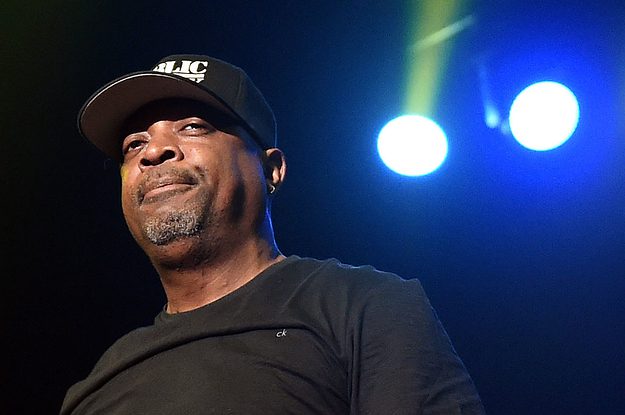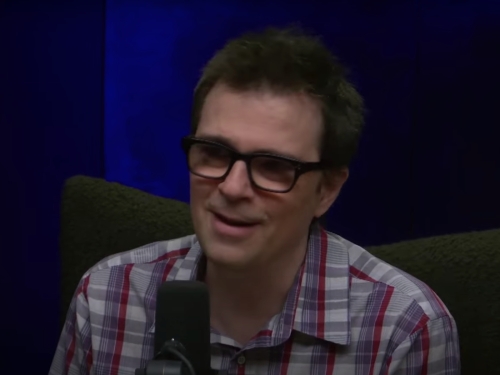
Chuck D Talks How Cornell Benjamin’s Murder Helped Create Hip Hop
By all accounts, Chuck D had the right to relax ahead of Hip-Hop 50. As the leader of Public Enemy, he helped redefine the role rappers could play in a political climate, combining an authoritative tone with the sort of righteous indignation that topples empires. But instead, he gave himself a challenge: “What can we do for hip-hop instead of what hip-hop can do for me?”
It’s a fair question, and Chuck found some of his answers by working on PBS and BBC’s Fight The Power: How Hip-Hop Changed the World. He found another by narrating Can You Dig It? A Hip-Hop Origin Story, a five-episode Audible docu-drama that explores the tragedy—and resulting community evolution—that helped spawn the world of hip-hop. While traditional wisdom indicates that hip-hop began with an Aug. 11, 1973 party, Can You Dig It? adds a story of transformative trauma to the narrative.
On Dec. 8, 1971, just under two years before that famed gathering, a respected peacekeeper by the name of Cornell “Black Benjie” Benjamin was killed while trying to end a violent conflict between his crew, Ghetto Brothers gang, and an area rival. While his death remains a tragic loss, it’s said to have ignited a period of peace and cooperation that eventually led to the sort of parties Kool Herc threw on that day 50 years ago.
Blending scripted “scenes” with bits of insight from folks in and around the culture at the time of the story, Can You Dig It? was conceived and produced by PB&J Productions LLC’s Pete Chelala, Bryan Master and Julian Voloj. Chuck executive produced the series alongside his Channel Zero partner Lorrie Boula. If it isn’t rap’s origin story, you could call it a prequel.
“This documentary we put together really talked about the germination of the seed of the story behind the story of hip-hop,” Chuck says of the doc, which is available on Audible now.
Chopping it up with Complex, Chuck D speaks on Can You Dig It?, Benji, the parameters of a rapper’s social responsibilities and more.
Benjie’s death sent some shockwaves through New York, but you were in Long Island at the time. Do you remember hearing anything about it?
Inklings, [but] it was mythology. People always had broad strokes about the story behind hip-hop. Oh yeah. There was gangs and the gangs stopped and made the truce. And then out of that, Afrika Bambaataa and Grandmaster Flash made hip-hop. That’s the mythology that had truth to it, but no detail. This Audible original was about the details of, Can You Dig It? later on. People kind of even go back to talk about that movie in the late 1970s [called] The Warriors. Yes, Warriors and all that. But once again, that was pulling elements from the truth, that was like a movie about the gangs in New York at a particular time, but that was just like a Hollywood version of what was already happening in the earlier part of that decade. So yeah, it’s been floating around, but the whole key about documentation [is] you gotta put it down. You gotta put it to paper.
That’s what’s always great about hip-hop—spreading stories across generations.
But listen, in all fairness, it also could go off to the races and, and leave the whole truth of the matter if it’s not kind of put in check or reality. ‘Cause everybody has a story to tell. Sometimes you go and ask 10 people what happened when they all saw the same thing, you find out, “Damn, I got eight different stories here. Somebody’s gotta pull it down and kind of make sense of it.” And so that’s what I’m saying when I narrated it, my common sense about it all lined up.
So in his life, Benjie was a peacekeeper. There’s been a lot of violence in rap, but there have also been people who are peacekeepers. Who are some artists today that you think do a good job with keeping the peace in hip-hop?
I mean, you gotta name a lot of the women artists, they’re not in the beef, so you got Rapsody. A lot of the women artists in hip-hop are underrated because of the peace that they bring. Their whole energy is different. As far as males, you have your mainstream artists, Kendrick Lamar and J. Cole and Joey Bada$$. And then you got your artists are substantial. Consequence had a great big turnaround. Cormega has really become like a guru. He’s like a sensei teacher right now coming from the Queensbridge Projects, so everything you hear Cormega spit is life-giving. Brother Ali, who really took his study of the Islamic faith to the next level being in Istanbul and still spitting and rhyming and doing podcasts. You got legends like DMC, that always speaks truth to power. When you look at Doug E. Fresh, you only smile. Same thing with Snoop Dogg—you only smile. And Snoop Dogg’s come a long way from the beginning. Peace is usually the theme of hip-hop.
We see that there’s a unified front with the strike in Hollywood. What’s preventing hip-hop from doing something similar?
The biggest difference is the education of the music. And also music is less organized in its different factions. For example, I’m a member of the Hip Hop Alliance. So where Kurtis Blow is the elder chairman, chairman KRS-One, I’m President MC Lyte involved. It’s the first hip-hop union. And our partnership is with SAG-AFTRA who coincidentally is also on the major part of the strike because the Screen Actors Guild. The actors and the writers, and we’re in solidarity with that. But the faction of hip-hop in music is still a known, an unknown, unorganized notion for 50 years of being acknowledged as a true music in the music. Although it’s been a process of industry. So it’s a first [time] for everything. Somebody’s just not gonna get up and put up, pull up your bootstraps for you in every single case in the matter. So it is about educating who you are, what you’re in the middle of, and how you go about proceeding to get what you want and protect what you have. So in this case, you know, when you tell people you got a union, that right there is an education. Usually people in the United States wait for news to wash up on their shore. It has to be big. And when it’s big, it’s washed up on your shore, then you know. It’s like the news has to be shocking, ’cause most people are lulled halfway to sleep anyway. So it’s an educational thing. People know that they boom, “Oh, man, all the actors and all the writers are on strike and I watch movies and TV now on my phone every day.”
So they noticed the strike, because [the strikers] had collective solidarity. The biggest difference in hip-hop, even as an art form that’s been in corporations, is that in the beginning it was always a collective community effort anyway. Hip-hop didn’t make no noise unless the DJ got with the MC, got with the break dance, got with the graffiti, all the elements came from the community and to go forward, like, there’s this thing called hip-hop. It’s growing in the Bronx. That’s 1973. The corporations got involved with taking the vocalists and now hip-hop has been individualized for the last 25 years. When you say hip-hop, you’re naming one name in the beginning. When you say hip-hop, you’re naming a bunch of different collectives. It’s always this clamoring to be part of a collective anyway. They don’t really sign contracts as groups. Name a hip-hop group that signed in its fullness. You remember De La Soul because when they lose a member like De La Soul and A Tribe Called Quest and Whodini, you’re like, “Wow, can this group still go without that missing member? But the only recent relevant group is, you know [Migos] when Takeoff was killed.
Groups were in the beginning, individuals were in the end. They were contractually steered by an industry to become soloists. It’s the biggest difference, but there’s a clamoring to collect. And so that’s why we feel unionizing brings everything full circle, that you want to be part of a true posse team to get your voice to be truly heard.
So, Public Enemy was known for speaking truth to power, and there are some rappers that still do. Recently, Ebro from Hot 97 called out Drake for not speaking on prominent issues that affect Black Americans in his music. Do you think artists have a responsibility to speak on big issues?
I always thought that if people want to claim to be doing truth and real as an MC, I always thought that rappers should at least be truthful about their age. I just think that, when artists try to not say their age and rap and rhyme their age, I think it leads to a twisted conundrum of like, “OK, if you just speaking to kids, you pimping them or [are] you raising them. That’s the, that’s the question. I don’t think that’s a social responsibility, but that’s the question: are you pimping them or [are] you raising them. If you 40 years old and your crowd is 20, what are you there for if you getting their money? What are you giving them?
I don’t think there’s an obligation for somebody to make their art for, I don’t think it’s—people make their art to be whatever, but once you start promoting your art and needing situations to promote your art to a demographic, then I think you gotta kind of bring some kind of truth to your power. If we’re coming from an aspect of being OGs in the artform, then you should deliver OG shit.
With the idea of, “What can you do for hip-hop?” you mentioned earlier. So the idea is for the exchange to be symbiotic?
It’s nothing worse sometimes [when] younger people, when they look at older heads and they be like, “Yo, why is this old head here?” If they’re here dropping some jewels, it’s cool that they’re here. If they’re in their lane, quiet in the corner or whatever the fuck, you know, that’s cool. But once they all trying to be dominant in this space that that young energy is trying to come up and figure itself out, then I think we got a violation.



